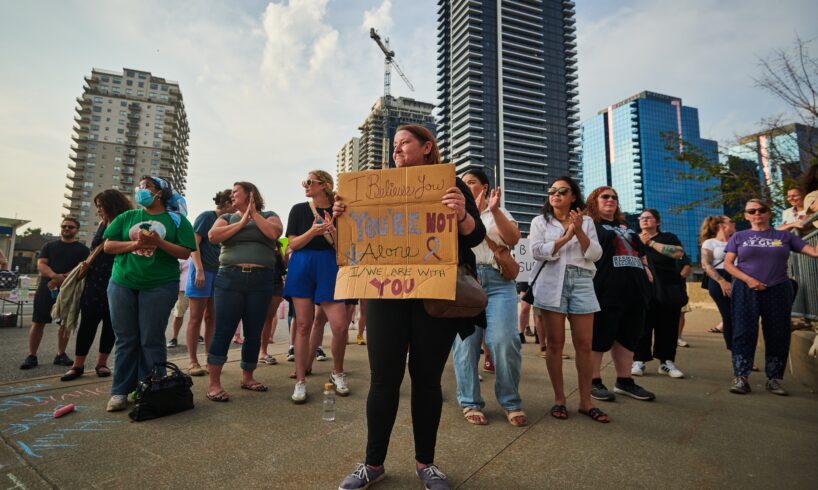
Open this photo in gallery:
Demonstrators in support of E.M. rally outside the London, Ont., courthouse on Thursday, after the not guilty verdict was delivered in the trial of five former Canada world junior players.Sammy Kogan/The Globe and Mail
Some sexual-assault survivors and legal experts say that restorative justice could be an alternative for complainants to find closure and accountability, in the wake of the Hockey Canada verdict that left many advocates reeling.
Justice Maria Carroccia acquitted five former junior hockey players of sexual assault on Thursday after a trial that had the complainant, known publicly as E.M., spend seven days under cross-examination by the defendants’ lawyers.
In her ruling, the judge found E.M. to be not credible nor reliable and said that she had consented to sexual activity that took place in a hotel room in 2018.
The verdict left some advocates for survivors of sexual violence feeling heartbroken and disappointed. They also said the ruling employed misconceptions about how victims behave during and after an attack.
Read the judge’s full decision in Hockey Canada sexual-assault trial
Following the verdict, Megan Savard, lawyer for player Carter Hart, said that her client would have been willing to engage in a restorative justice process and that the Crown did not have to take the case to trial.
However, in Ontario, Crown attorneys are instructed not to pursue restorative justice in sexual-assault cases because they are viewed as too serious, according to Jennifer Llewellyn, a professor of law and Chair in Restorative Justice at Dalhousie University’s Schulich School of Law.
Ontario Attorney-General Doug Downey’s office did not respond to a request for comment.
Restorative justice is an alternative to criminal trials that sees all parties participate in meetings and counselling, and it can also draw in institutions and the broader community. It focuses on acknowledging and understanding the harms caused by one’s actions, and the impact they have on others, and it does not typically include a traditional conviction or sentencing.
According to the federal Department of Justice, there are four national restorative justice programs in Canada and other programs are also available in 10 provinces and territories.
In Ontario, there is a moratorium on restorative justice in sexual-assault cases, except in special circumstances, but it is used in cases of other offences such as theft, assault, break and enters, mischief, public intoxication and more. The same is true in Nova Scotia.
Some legal experts and survivors say the criminal justice process can be hostile and retraumatizing for complainants in sexual-assault cases and that restorative justice may provide a more effective path to healing.
“Restorative justice centres the needs of the survivor and promotes healing, invites accountability and does not centre punitive or carceral outcomes,” said Dee Rooke, a representative for the Ontario chapter of Survivors for Justice Reform, a global coalition of advocates against gender-based violence.
Open this photo in gallery:
Sexual assaults are reported to police at a rate of 6 per cent, Statistics Canada says.Nicole Osborne/The Canadian Press
Rooke is a survivor of sexual violence and sees parallels between their experience and E.M.’s.
When their own case went to court, they were deemed credible but not reliable because they were intoxicated at the time of the encounter. The judge even went so far as to say the whole incident could have been “a bad dream,” Rooke said.
Had they known about restorative justice at the time and had all parties agreed, Rooke said they might have had the validation they needed to begin to heal.
Dalhousie University’s Prof. Llewellyn says the current criminal justice system has a limited approach to sexual-assault cases.
“It doesn’t allow us any nuance on really complex cases that have cultural components, that are about behaviours that are really troubling and really problematic and can cause lots of harm, but might not meet the threshold of criminal standards of proof,” she said.
She said “absolutely” restorative justice should have been explored and considered in the Hockey Canada case, if there was willingness, instead of the criminal trial – or alongside it.
Prof. Llewellyn called it “highly problematic” that the Ontario Crown is not willing to consider restorative justice in sexual-assault cases. “That’s just a misunderstanding of how restorative justice should be undertaken or designed,” she said.
The key legal issues at the heart of the Hockey Canada verdict
She said the Crown has the discretion to be able to pursue restorative justice, but the standing instructions from the Ontario Attorney-General say they can’t use it.
Robin Parker, a lawyer and former Crown prosecutor who works with complainants and undertakes sexual violence investigations for institutions, said the Hockey Canada trial caused a lot of harm and will prevent other women from coming forward.
She said a restorative justice process wouldn’t necessarily have worked for the Hockey Canada case, because unlike Alberta, for instance, Ontario doesn’t have a system set up to handle it properly.
“The carceral response to sexual violence as a project is a failure,” she said, referring to an emphasis on the corrections system. “The reporting rates are low, they have not changed,” she added.
Statistics Canada says that sexual assaults are reported to police at a rate of 6 per cent, a figure that has remained stable for the past 15 years.
Farrah Khan, a sexual-violence counsellor and educator, said she’s seen cases of restorative justice go very well when people who have done the harm are willing to put in the work before they even meet with the survivor.
“I’ve also seen it where there’s such a power imbalance, and the people who’ve caused the harm see it as an easier tool for them to use,” she said.
The Hockey Canada trial verdict has been delivered. Here’s how we got here
She said when it’s done well, perpetrators have to engage in months of “accountability counselling” to own what they did.
“For me, it has to be transformative for all parties. There has to be investment in it, and that means deep counselling around accountability,” she said.
Restorative justice could still be used after the verdict in the Hockey Canada case, if all parties consent, said Crystena Parker-Shandal, an associate professor in social development policies at the University of Waterloo.
“I think a post-trial restorative justice process could really map concrete commitments, think about how people can engage in public education campaigns, mentoring,” she said.
With reports from Clare O’Hara and Colin Freeze





